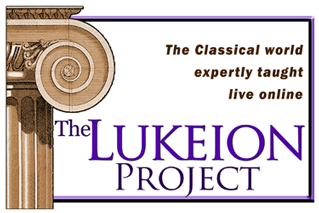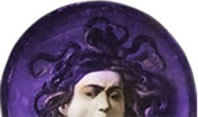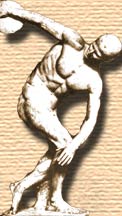Workshops at The Lukeion Project

Workshops are short courses on subjects that interest you or your learner. They do not have assigned academic requirements but they do have an optional quiz that opens after the final session should you want to challenge your knowledge or add the class to your transcript, as you prefer.
Each workshop consists of four 1-hour sessions. In the summer, classes meet four days in-a-row. During normal autumn and spring semesters, workshops meet once-a-week for four weeks in-a-row. We are now offering a limited number of workshops by recording only. You may view and review these recordings as many times as you please during a given semester. The cost of each workshop covers four hours of instruction and access to a class web page that includes links to important online resources, online games to help challenge and review, and questions-for-thought to serve as discussion starters or writing prompts at home. Workshops are the perfect accent to your own curriculum.
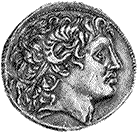
When planning your schedule, remember that all of the times listed are Eastern time. Please adjust for your time zone accordingly.
Normally, recordings of each session will be kept on our server for only 7 days after the live meeting and then it will be deleted unless the workshop is listed as "recording only."

Here is our full selection of 25 workshops offered at various times during the year.
- Register for 2016-2017 classes
- Check course availability
- 2016-2017 catalog (for workshop dates and times)
- tuition rates
 A Good Place to Start:
A Good Place to Start:
Meet the Greeks
Recording only, autumn 2016
The Greeks were one of the most influential cultures in the development of western civilization. Due to the conquests of Alexander the Great, and later the Romans, many aspects of Greek culture were spread from India to Spain, and from Egypt to Great Britain. Spend some time investigating the ancient Greeks, and you'll be surprised at how much of the world around you today began among these creative and experimental people! This illustrated workshop includes sections on art, culture, history and society. It’s a great introduction to Greek history, background for those studying the Greek language, and a useful overview for those taking the National Greek Exam.
Meet the Romans
Recording only, spring 2016 and 2017
The Romans had a profound influence on western society as we know it today. In architecture, politics, art, city planning, legal matters, warfare and more, we the Roman elements around us every day. This workshop is a great introduction to the Romans. It’s also great background for those studying Latin, and cultural topics included on the National Latin Exam are covered. Included is an illustrated discussion of the founding myths of Rome, its early history, Republican political institutions, the transformation to empire, what the Romans wore, how they decorated their homes, some of their great engineering accomplishments and even their famous entertainment in the arenas and at the racetracks.
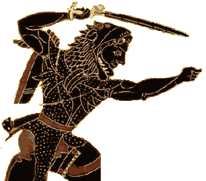 Ancient Warfare
Ancient Warfare
Art of Greek Warfare
summer 2016
Remarkably, the ancient Greeks seemed to define themselves by conflict, though only the Spartans truly developed a standing professional army prior to the rise of Macedonia. Nevertheless, they stopped the advance of the mighty Persian Empire and tutored the Romans in the art of warfare. This illustrated workshop begins with what we know of warfare in Bronze Age Greece and continues through the siege warfare of the Hellenistic period. Along the way we investigate arms and armor, battle tactics and defining conflicts in Greek history.
Art of Roman Warfare
Summer 2016
When Athens was at the height of its power and influence, Rome was a still just a struggling hill-top village. Several centuries later Rome had transformed itself from backwater town to ruler of an empire stretching from the Persian Gulf and the Nile, to the farthest reaches of Spain and the island of Britain. Learn how a citizen militia became the most formidable and successful army in the Mediterranean. Our illustrated workshop will examine the great personalities, organizational developments, technical advancements, and turning-point battles that made such a transformation possible.
Theater of War
Not currently scheduled
When men fought wars hand-to-hand and eye-to-eye, the Greeks and Romans sometimes got creative to insure victory or maybe even to scare the enemy into running away without a single loss. Flying men, ambushes, the first hand ‘grenades,’ miles of walls and bridges appearing overnight: the original shock and awe campaigns! Great workshop for any battle-history buff.
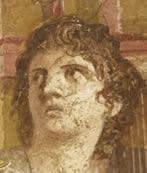 Classical Literature and Mythology
Classical Literature and Mythology
Please also check out our full literature semester courses: Survey of Greek, Survey of Latin literature; Mythology Alpha & Beta
The First War: Homer’s Iliad
Summer 2016
Of the many stories generated by the epic Trojan War, no title is more recognizable than Homer’s Iliad. It’s absolutely essential to understanding the national identity of both the ancient Greeks and Romans. But did you know that it doesn't’t include the whole Trojan story? This illustrated workshop will place Achilles and his fellow-warriors firmly in their context by filling in the gaps with the info that Homer assumed you already know. We’ll investigate the site, the foundational story-lines that Homer leaves out, the geographical and cultural context, and the themes that make this epic relevant to modern readers. Parental guidance: warfare themes are not suitable for everyone. This epic is also covered in our semester course Mythology Alpha. Please obtain a copy of the Iliad, translated by Stanley Lombardo. Robert Fagles' translation is also acceptable. Recommended for AP Latin students in preparation for autumn readings.
Of Men & Monsters: Homer’s Odyssey
Summer 2016
This is one of the first recorded adventure stories, but it’s written so well that modern readers still put it on their favorites list. Clashing rocks, one-eyed man-eating monsters, evil villains and undying love – it has something for everyone. You’ll be surprised at the number of literary, artistic and cultural allusions that have been inspired by the Odyssey – they’re all around you! This illustrated workshop will help you better understand the great work by including discussions from archaeology, geography, and related literature that all illuminate this masterpiece of Greek literature. Students will read approximately a quarter of the text for each class session.This epic is also covered in our semester course Mythology Alpha. Please obtain a copy of the Odyssey, translated by Stanley Lombardo. Robert Fagles' translation is also acceptable. Recommended for AP Latin students in preparation for autumn readings.
Rome’s Epic: Vergil’s Aeneid
Not currently scheduled
The Aeneid is the story of Aeneas, a Trojan who, fleeing the ashes of his fallen city, went on to experience great tragedy as well as great victory. The main hero struggles with an ageless question: was I put on this earth to find a quiet spot of comfort or to serve a greater purpose than myself? Not only "a good read" but also great insight about how Roman ideas were foundational to early American notions of civic duty. This epic is also covered in our semester course Mythology Beta. Please obtain a copy of the Aeneid translated by Robert Fagles.
Worst Case Scenario: Greek Tragedy
Not currently scheduled
Aeschylus, Euripides and Sophocles wrote dramas that explored extreme moments of human angst. If you enjoy a good suspense thriller, these myth-based stories will thoroughly delight you. You’ll be amazed at how deeply these ancient playwrights explored the human condition, and you’ll be left pondering questions you’d never before considered. Explore the origins and stagecraft of Athenian drama, and read representative works by its 3 greatest tragic playwrights. We ‘ll read Agamemnon, Oedipus Rex, and Medea and cover all the basics of Greek theaters and drama. Oedipus Rex and Medea are also covered in our semester course Mythology Beta. Please obtain a copy of the Greek Tragedy, Penguin (contains all three plays covered in this workshop).
Best Myths Ever: Ovid’s Metamorphoses
Not currently scheduled
You may already know a few of the many famous myths that come to us from this magnum opus of the Roman poet Ovid. Born right at the moment that Octavian (soon to be Augustus) was transforming the Roman Republic into an empire, Ovid would compose Metamorphoses ("Changes") to explore the topic of "newness" through epic mythological tales. Augustus' long, prosperous and peaceful reign gave birth to a golden age of literature, but it was not without its drama; Ovid was mysteriously exiled at the height of his career! Sometimes tragic, sometimes sweepingly grand and sometimes tongue-in-cheek funny, these are the tales that often appear in mythology as "THE" versions of choice. This epic is also covered in our semester course Mythology Beta. Please obtain a copy of the Metamorphoses translated by Charles Martin.
 Classical Archaeology
Classical Archaeology
Troy: horses, heroes, history
Not currently scheduled
Maybe you’ve heard of the Trojan horse, the Iliad or even the Odyssey - but did you know that Troy was real? Archaeologists have proven that it was a well-fortified prosperous city that was so important in the ancient world that several modern nations still claim it as their founding city. Check out the myth and the reality of this 5000-year-old city (taught by an archaeologist that worked there!)
Become an Archaeologist
Not currently scheduled
Whether it comes from a Hollywood movie, a TV documentary, or a library book, nearly everyone at some point wonders what it’s like to be an archaeologist. This is your chance to find out. Get an up-close view of the life of an archaeologist. We examine all aspects of life on a dig: from the methodology of excavating and documenting, to the mundane questions of surviving an excavation: What does an archaeologist eat? Where does she live? How do you do your laundry? How does one become an archaeologist? Do you really use a toothbrush and dental pick to dig? What do you do with what you find? Did you ever find anything REALLY cool? This class is interactive with plenty of Q&A time and illustrations straight from the instructor’s excavations in Jordan, Greece and Turkey.
Archaeology of Mass Destruction
Not currently scheduled
If you’ve ever looked at the ruins of an ancient building you know that it’s difficult to reconstruct the past. Wouldn't’t it would be wonderful to take a film crew back in time to see what life was really like? The swift and utter destruction of a special few towns has granted the next best thing. For these sites the end came so quickly that bakers left bread in the oven, and families left dinner on the table! We tour Akrotiri, Pompeii and Herculaneum and talk about the phenomenal details preserved by murderous volcanic eruptions.
Archaeology & Apologetics
Not currently scheduled
Archaeology deals with the remnants of the past; does it have anything to say about the accuracy of the Bible? What are we to think when we read sensational media reports that threaten to "bring down 2000 years of the Christian faith"? It’s been spectacular in its vindication of some Biblical passages, but it’s silent on others. This illustrated workshop examines the proper uses and the abuses of what archaeology has to say about the Biblical record. The instructor is a committed Christian with advanced degrees in both New Testament and Classical Archaeology, and 10 years excavation in Greece, Jordan, and Turkey.
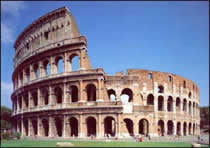 Classical Art, Architecture and Archaeology
Classical Art, Architecture and Archaeology
Fruitful Fields and Fabulous Feasts
Spring 2016, spring 2017
From the simplest street foods of Pompeii to the elaborate delicacies of a Greek symposium, food fueled the poets and kept the centurions marching. Come explore the food of the ancient Greeks and Romans and the fields and farms that produced it. Learn the importance of agriculture to these ancient civilizations and pick up a few recipes too. For those who enjoy cooking, gardening, ancient cultures, and eating, this workshop will provide everything from “eggs to apples.”
Feats of Roman Engineering
Not currently scheduled
The Romans weren't just the most fearsome fighting force in the ancient Mediterranean; they were also universally admired for the heights to which they took civilization and all of its trappings. From the most extensive road system across three continents, to immense and awe-inspiring enclosed spaces, to the most elaborate water works of the entire ancient world, it was the Romans who perfected many of the conveniences and constructions that we take for granted as staples of modern life. When the luxury-addicted emperors wanted a problem solved, the Romans usually succeeded – with enduring results! None of the previous great civilizations of the Mediterranean (the Egyptians, the Persians, the Greeks) achieved the Romans’ level of engineering brilliance. This illustrated workshop examines both the common place achievements and the spectacular engineering marvels that they have bequeathed to us.
Vase Painters and Story Tellers
Autumn 2016
If you've ever spent time in a good museum looking at Greek and Roman pots, you know that vase painters not only painted beautifully, but they also told stories with their art. Learn how the pots were created and then go on to hear the tales they had to tell! Get ready to see some beautiful art and be prepared to decode ancient pots with skill.
Right Ratio: Greek Architecture
Not currently scheduled
Anyone who has seen the most elegant buildings of our nation’s first century benefits from ancient Greek principles of detail, balance and ratio. This workshop unpacks the secrets behind the development of the architectural orders and the design principles behind Greek monumental architecture. Perfect workshop for anyone interested in architecture, and engineering.
Perfect Proportion: Greek Sculpture
Not currently scheduled
While many ancient civilizations produced objects of breathtaking craftsmanship, who learned to copy human form and then create art for the sake of beauty? The Greeks, of course! This workshop will begin with the amazing sculpture of Bronze Age Cyclades, and then the development of sculpture through the Archaic smile, the perfection of fifth century figure, and the renaissance of art after Alexander.
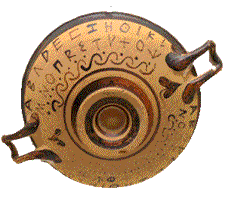 Ancient Language
Ancient Language
Bizarre Ancient Languages & Alphabets
Summer 2016
How did people all agree on an alphabet and then learn to read and write it? This class will show you some of the first written words and some of the weird writing systems that developed in the ancient world. We’ll examine the mysteries, alphabets and ideas behind Linear A, Linear B, Cuneiform, Hieroglyphics, Greek, Hebrew and many more. You may be inspired to create a new font or language or learn a very ancient one!
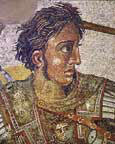 Historical People, Places, and Events
Historical People, Places, and Events
Alexander the Great
Not currently scheduled
The most successful general in all of history, Alexander led his men to the end of the planet and back. But there’s much more to this ancient larger-than-life conqueror than just his military prowess. He spread Greek civilization all the way to the Persian Gulf, set the trajectory of western culture, and managed a uneasy relationship with his soldiers, subjects, and family. This lavishly illustrated workshop is filled with stories and little known quirky facts that will ignite your interest in ancient history.
Julius Caesar
Not currently scheduled
He was one of a kind...and that eventually got him into a lot of trouble. He not only survived the turbulent period of Sulla and the Roman Civil Wars, but also came out on top--even ahead of his fellow triumvirs. How could he be so hated that he was murdered by a mob of senators, yet so loved that his funeral pyre is still adorned with fresh flowers today? He is truly a subject worth more study! (companion courses: Annihilation and Inheritance)
Antony and Cleopatra
Not currently scheduled
Hollywood would have you think that Cleopatra wielded only glamour power. This illustrated workshop examines the luxurious and dangerous life of the most militarily powerful, intelligent and wealthy woman to rule in the ancient world. Some Romans loved to hate her. Others fell powerfully under her spell. Was she industrious and wise or shallow and depraved? Her life with one of the top men in Rome, Antony, may reveal the answer . . . or maybe not! Find out more about the last Queen of Egypt and then decide. (companion courses: Assassination and Inheritance)
Caesar Augustus
Not currently scheduled
Young Octavian was named “heir” of Julius Caesar’s wealth, but would he inherit his power and prestige? Rome’s most powerful politicians were too quick to write off this sickly, serious 19-year-old. He was destined to bring down the Republic and replace it with the most powerful empire the Mediterranean had ever seen! Who could have known that he would become Augustus Caesar, Rome’s most powerful, longest-lived, and best loved ruler? This illustrated workshop explores Octavian’s path to power, the secret of his success, and the genius of his leadership. (companion courses Assassination and Annihilation)
Imperial Murder Mystery
Summer 2016
 Join us for 150 years of palace intrigue, conspiracy, and even matricide! If you thought it might be cool to rule your own empire, this might change your mind. With daggers, poisoned mushrooms, and hidden peril around every corner, the halls of Rome's imperial palaces were not for the faint of heart. From the life-time dictatorship of Julius Caesar through the first century of the Roman Empire, few emperors died of natural causes. You’ll get caught up in the mystery, vote in polls, discover that truth is stranger than fiction, and learn 150 years of Roman history along the way! This is one of our most popular workshops so register early.
Join us for 150 years of palace intrigue, conspiracy, and even matricide! If you thought it might be cool to rule your own empire, this might change your mind. With daggers, poisoned mushrooms, and hidden peril around every corner, the halls of Rome's imperial palaces were not for the faint of heart. From the life-time dictatorship of Julius Caesar through the first century of the Roman Empire, few emperors died of natural causes. You’ll get caught up in the mystery, vote in polls, discover that truth is stranger than fiction, and learn 150 years of Roman history along the way! This is one of our most popular workshops so register early.
 Biblical Studies and Ancient Religion
Biblical Studies and Ancient Religion
Archaeology & Apologetics
Not currently scheduled
Archaeology deals with the remnants of the past; does it have anything to say about the accuracy of the Bible? What are we to think when we read sensational media reports that threaten to "bring down 2000 years of the Christian faith"? It’s been spectacular in its vindication of some Biblical passages, but it’s silent on others. This illustrated workshop examines the proper uses and the abuses of what archaeology has to say about the Biblical record. The instructor is a committed Christian with advanced degrees in both New Testament and Classical Archaeology, and 10 years excavation in Greece, Jordan, and Turkey.
The Crucifixion Week
Not currently scheduled
All 4 Gospel writers give us important information about Jesus’ life in this critical week – half of John’s Gospel is devoted to it! This illustrated workshop is a chronological trek through the major events leading up to, and encompassing the Passion Week. In addition to integrating the 4 Gospel accounts, we pull in relevant historical and archaeological sources to get a full picture of the interplay of culture, religion, law, Roman and Jew. We demonstrate that Jesus was clearly in charge every moment and knew exactly what he was doing. This fascinating study will enrich your historical and spiritual understanding of the week that changed the world; it’s a great resource for those in the ministry.
Behind the Curtain of Ancient Mystery Religions
Not currently scheduled
Did you know that rituals from one mystery religion required you to go swimming with a piglet and then be insulted, while another invented the earliest form of Chia pets? Still a third was a real blood bath! Take a look at the major Mystery Religions from the ancient Mediterranean: The Eleusinian mysteries, Mithraism, Cybele/Magna Mater, Isis & Osiris, and Gnosticism. We promise, you will be surprised at just how very different and bizarre all of these ancient cults were.
